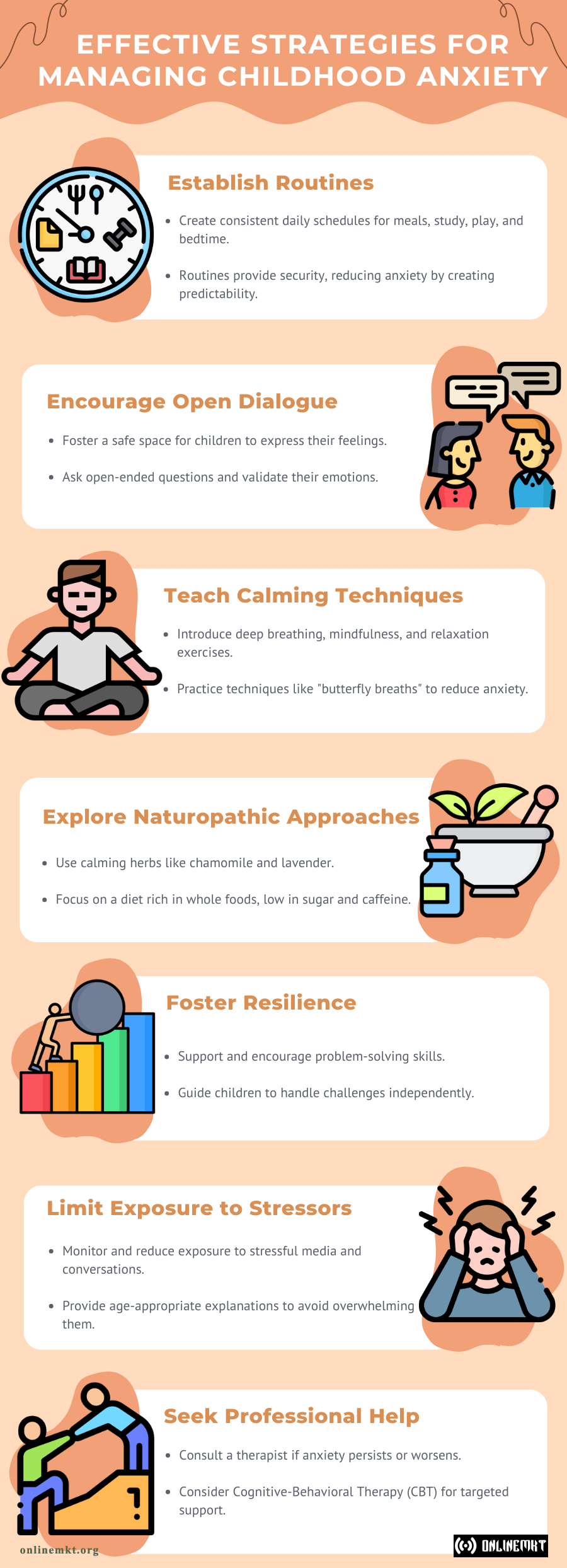Effective Strategies for Managing Childhood Anxiety

Let’s equip our children with the tools they need to thrive, not just survive.
Childhood anxiety can be managed effectively when it is supplemented by emotional security, structured routine, and practical measures. Parenting and identifying early on allow both caregivers and parents to improve the emotional and general well-being of a child.
Childhood anxiety is seen in different ways such as separation anxiety, social anxiety, and generalized anxiety disorder. Early detection will be the key to effective treatment. The child may show excessive worry concerning future events, restlessness that is not continuously present, irritability, or even physical complaint like headache or stomachache that cannot be accounted for by medical illness. Recognition of these signs can allow parents and caregivers to respond accordingly and provide the right support to the child.
Effective Strategies
Establishing Routines
It is essential for children to have a daily routine. Having set times for meals, study, play, and sleep creates a sense of security and predictability. It aids in lowering anxiety caused by uncertainty, making children more in control of their surroundings. For example, being aware that bedtime follows storytime can cause a child to relax and feel secure, lowering the probability of nighttime anxiety.
Encouraging Open Communication
Open communication is a key factor in managing anxiety. Parents should ensure that there is an open and non-judgmental environment where children feel comfortable expressing themselves. This can be through responding to open questions like, “How was your day today?” or “Is there something that’s been worrying you lately?
By hearing and acknowledging the children’s emotions, parents allow children to grasp that it is natural to get frightened or scared occasionally. Through such practice, it normalizes occasional scary moment and also help to develop emotional intelligence with time. It helps to place children in a better position to recognize as well as monitor their emotions.
Teaching Calming Techniques
Instilling calming techniques let children become familiar with relaxing strategies like relaxation, mindfulness, and deep breathing which may be a real help at the time of anxiey. An easy technique is diaphragmatic breathing, where the child is told to breathe deeply into the stomach, hold the breath for several seconds, and slowly exhale it. This may be soothing to the nervous system and may reduce anxiety.
Practice of these techniques on a regular basis, perhaps at a time of quiet during the day, can habituate children to apply them when anxious or under stress.
Naturopathic Approaches
The addition of naturopathic remedies can also be helpful for childhood anxiety. Herbal remedies like lavender or chamomile can soothe the nervous system. Dietary modification that includes reduction in the consumption of sugar and caffeine and increased consumption of whole foods can enhance mental clarity and emotional stability. Naturopathic medicine is all about a holistic approach, addressing physical as well as emotional well-being, which can be particularly useful in the treatment of anxiety.
Fostering Resilience
Resilience-building is a sustained strategy that equips children with the ability to cope with anxiety more effectively. This involves presenting stable support, encouragement, and opportunities for kids to solve issues on their own.
For example, instead of jumping in to resolve a disagreement with a friend, parents can persuade the child to thoughtful on possible options and attempt solving it by him/herself. By means of love, empathy, and instruction, caregivers may enable children to acquire coping strategies and learn progressively to overcome adversity by themselves.
Limiting Exposure to Stressors
Being aware of what children are being exposed to has a significant impact on their anxiety levels. Avoiding exposure to stressful media messages, like violent news reports or violent video games, can reduce anxiety levels. Parents also have to be cautious when discussing sickness, financial problem, or other anxiety-inducing issues in the presence of children. Providing suitable explanations and staying calm oneself helps to avoid children being overwhelmed.
Seeking Expert Help
If such efforts fail, or the fear of a child continues to be more severe and does not mitigate, it would be advisable to seek the service of an expert in mental well-being. Specialist therapists for handling child anxiety may offer personalized solutions and support for children and parents. Cognitive-behavioral therapy (CBT), for example, is one common yet effective method of helping a child learn to resist and change wrong thoughts and behavioral patterns related to their fearfulness.
Conclusion
Child anxiety can be overcome through a combination of consistent daily routine, open communication, calming technique, and holistic approaches. Development of a nurturing environment of guidance and compassion enables parents to equip their children with the tools needed to deal with their feelings and be strong. These approaches not only help children cope with anxiety in the moment but also provide them with lifetime coping mechanisms for stress and uncertainty.